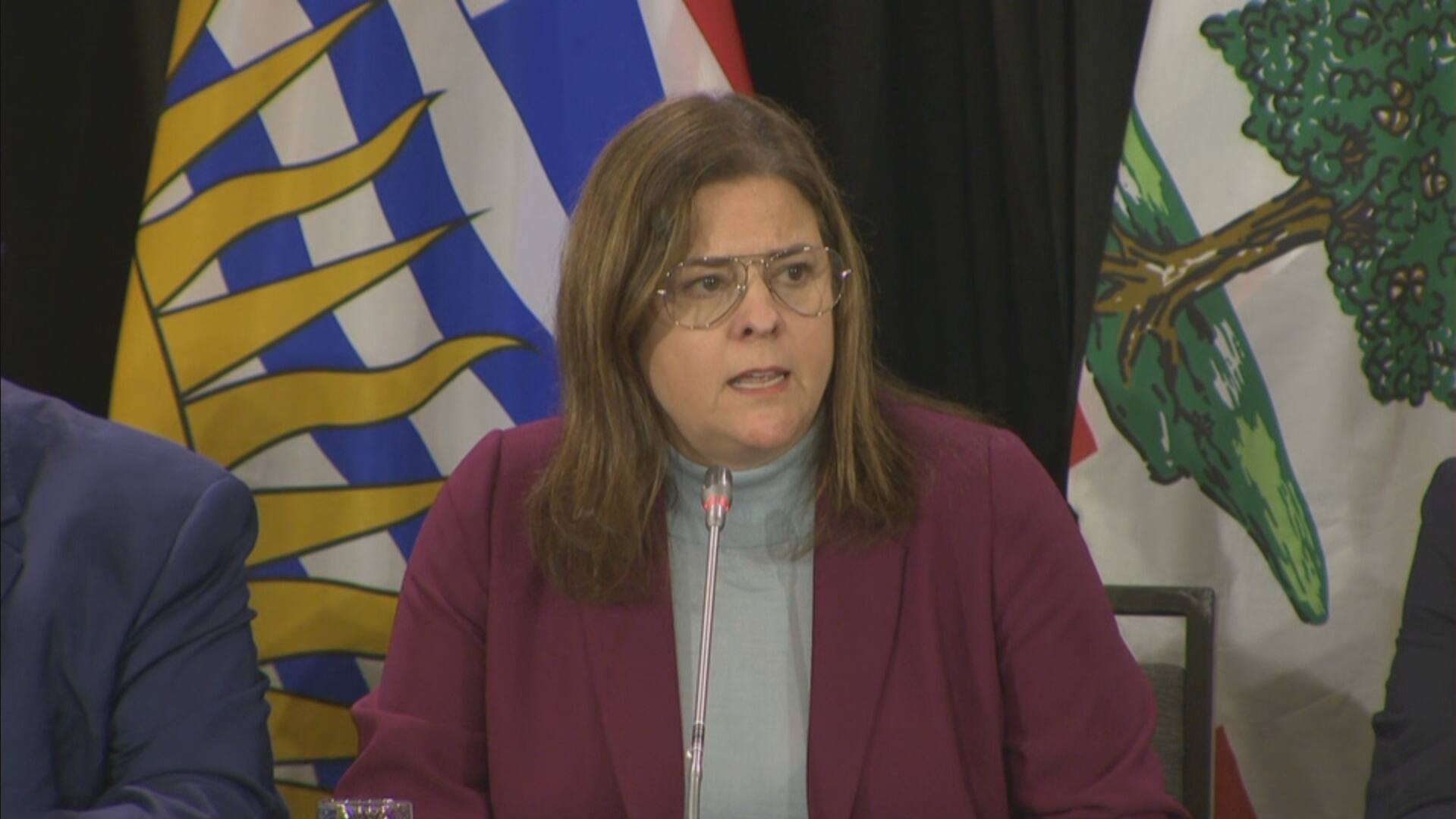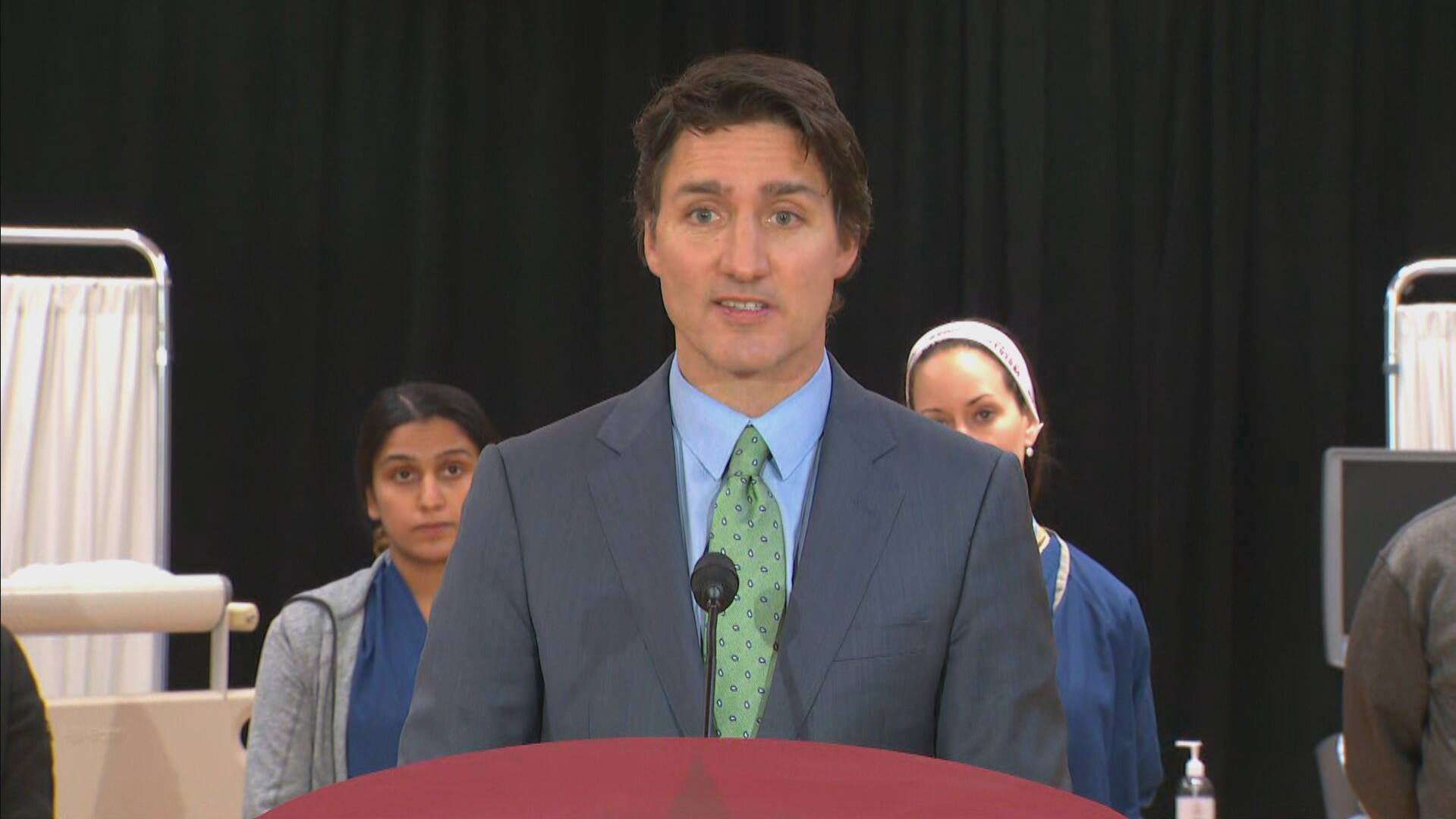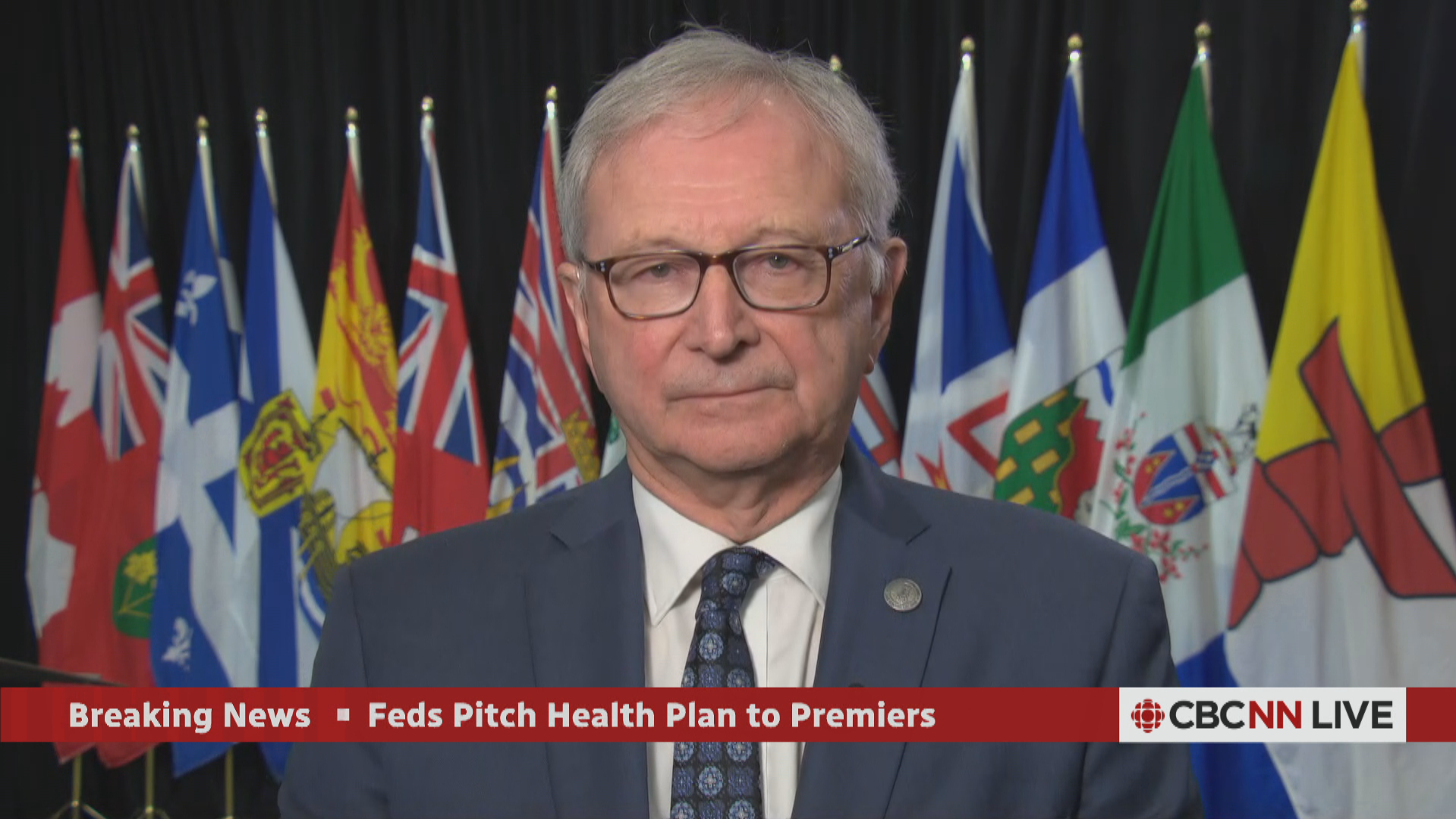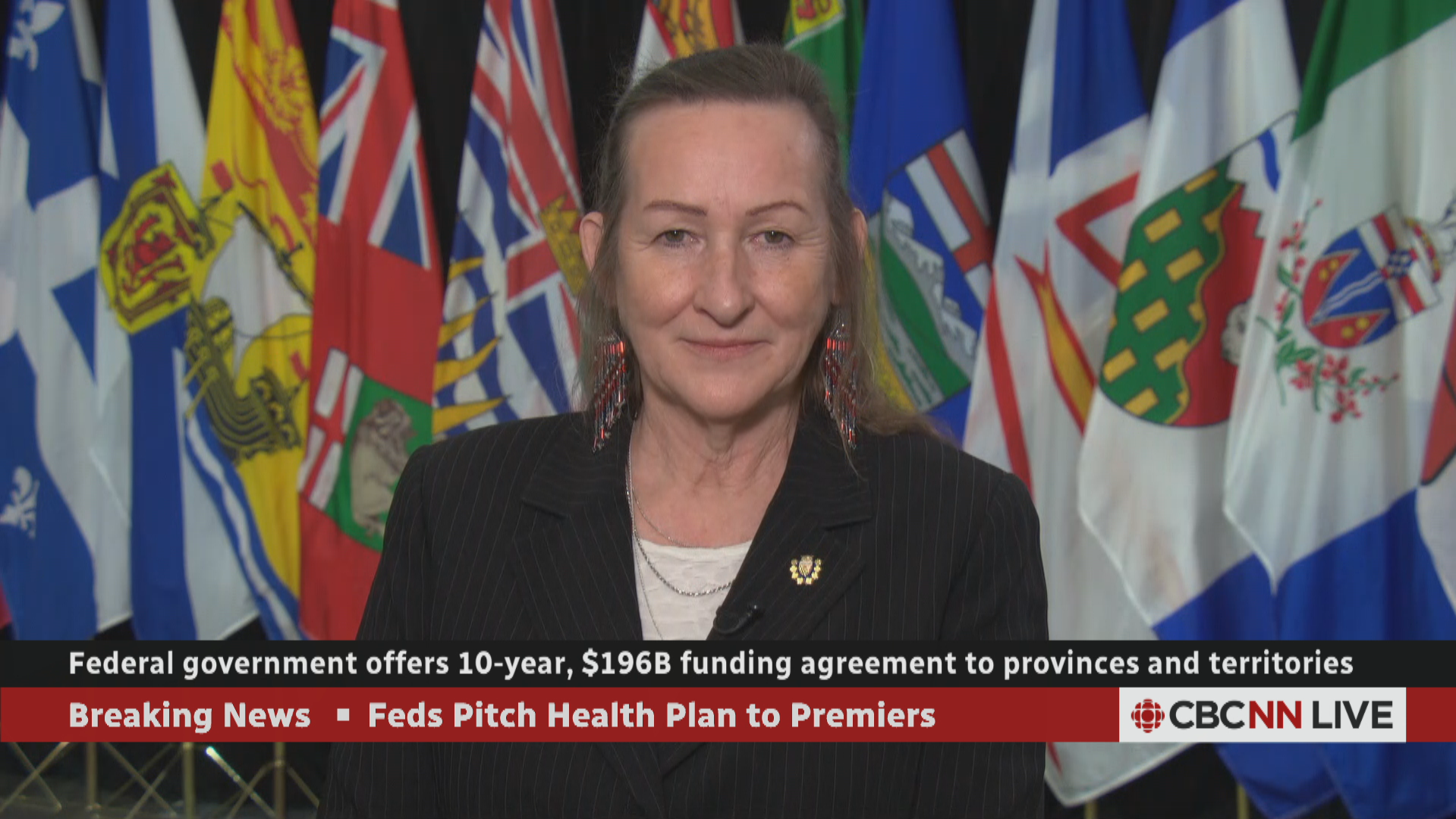Ottawa to propose 10-year health-care funding plan to provinces, territories
Premiers will meet with Prime Minister Justin Trudeau in Ottawa Tuesday to discuss the plan
The federal proposal will see new money flow as soon as the next budget. It will include a top-up to the planned across-the-board increase to the Canada Health Transfer (CHT) and substantial funding for bilateral agreements with provinces and territories to deal with their specific needs.
Sources say the proposed CHT increases, and the bilateral health deals, will each run for a period of 10 years.
Health-care funding has always been a contentious topic between the provinces and the federal government. The pandemic's effects on an already strained system have made the need for a new funding agreement more urgent.
On Tuesday, Canada's premiers will meet in Ottawa with Prime Minister Trudeau to pursue plans to deal with both long- and short-term challenges facing the delivery of health care in Canada.
On Monday, Trudeau said he was looking forward to sitting down with the premiers for what he described as a "working conversation" on how both levels of government can improve "outcomes for Canadians."
"We will be there putting more money on the table but it's also important to make sure the focus is on results and outcomes for Canadians," he said.
Trudeau said his government would work with the provinces over the "coming weeks" to hammer out the details of the new funding agreement and expressed confidence that Canada can afford to boost health-care funding.
"There will be increases to the funding that we're sending to the provinces for health care," Trudeau said. He would not say how large that boost will be.
Premiers react to proposal
Manitoba Premier Heather Stefanson, chair of the Council of the Federation, said premiers are looking for a "long-term, sustainable funding model" from the federal government.
Stefanson said she won't comment on details media have reported about Ottawa's proposal, but will instead wait until she sees the full details tomorrow.
"It's very difficult to make a comment on something that we haven't seen," Stefanson told a news conference Monday.
"I would have like to have seen the proposal ahead of time, there's no question … If we had had it ahead of time, we probably could have had a more fulsome discussion tomorrow."
Manitoba
Premier Heather Stefanson speaks to media on Dec. 8, 2022. Stefanson
said Monday that premiers have not seen details of Ottawa's health-care
funding proposal in advance of Tuesday's first ministers' meeting. (John Woods/The Canadian Press)
Saskatchewan Premier Scott Moe said he wants any funding deal to be permanent.
"It should not only be for 10 years but ultimately be wrapped into permanent funding, into the Canada Health Transfer, either today or eventually," he said.
New Brunswick Premier Blaine Higgs agreed that at least part of the funding boost should be made permanent.
"We're hoping there will be a portion of it that will be a continuous program," he said.
Higgs added that he doesn't mind if health-care funds from the federal government come with strings attached — such as requirements that the money be spent in certain areas — as long as those conditions align with his government's health-care priorities.
Yukon Premier Ranj Pillai said he'll wait to see the full details of the proposal before commenting.
"I think it's just a 'wait-and-see' until tomorrow. I think everybody is optimistic that they're going to table something that's going to be strong," he said.
Sticking points
One major sticking point in the negotiations has been the baseline for health-care funding in Canada. The provinces have been asking the federal government to increase the CHT's share of total public health spending from 22 per cent to 35 per cent.
The federal government has said it will offer more money but rejects the claim that it only pays 22 per cent of the cost of health care. Ottawa has argued that the tax points transferred to provinces in 1977 bring the federal share closer to 38 per cent.
The second major sticking point has been about placing conditions on any increased funding. The federal government says it wants additional funding to be targeted at specific areas.
The provinces have pushed back by insisting the provision of health care is a provincial responsibility. But Quebec and Ontario recently have shown some willingness to meet the federal government half-way.
NDP also wants condition on CHT increase
Earlier Monday, NDP Leader Jagmeet Singh called on Prime Minister Justin Trudeau to make any health-care funding agreement with the provinces conditional on the provinces agreeing not to direct additional resources toward for-profit private health-care providers.
"The prime minister was very strong on this. He said there are going to be conditions. I absolutely agree there should be conditions," Singh said Monday. "Those conditions should be public money should solve the problem.
"Public money shouldn't go toward a for-profit clinic being able to have more profit. Our public money should go toward solving the actual problem that we're up against, which is a shortage of health-care workers."
Last month, Ontario Premier Doug Ford announced his province would significantly expand the number of medical procedures that can be performed at privately run clinics in Ontario.
The expansion will start with diagnostic clinics performing 14,000 cataract operations a year before the program is expanded to allow clinics to offer MRI and CT imaging, colonoscopies and endoscopies.
Ford said these procedures will be covered by OHIP, the provincial health plan, and stressed that patients will "never use their credit cards" at the clinics.
Singh criticized the move and Trudeau's description of the expansion as "innovation," saying that public money should be used to bring more services into the public envelope.
With files from Richard Raycraft and Chris Rands
Trudeau pitches 10-year health-care deal with $46B in new spending
Premiers 'disappointed' by lack of new funding but want time to assess Ottawa's proposal
The deal, which is being pitched by the federal government as a generational fix for an ailing system, would begin with provinces and territories getting an unconditional $2-billion boost to the Canada Health Transfer (CHT) to address what the federal government calls "immediate pressure on the health-care system, especially in pediatric hospitals, emergency rooms and surgical and diagnostic backlogs."
Trudeau's proposal also includes a five per cent annual hike to the CHT for the next five years, with a built-in mechanism to permanently increase funding in the years after.
After the first five years, the CHT escalator will revert to a three per cent increase each year — but provinces and territories will be starting from a bigger base after years of larger than normal increases.
Government data suggests this funding boost will increase the CHT by some 61 per cent over the next 10 years. That amounts to about $17.3 billion in new money for the provinces and territories to prop up a faltering system.
Premiers want time to assess proposal
Following their meeting with Trudeau, the premiers said they wanted to take time to assess the federal proposal. They also said they would like to see the federal government put forward additional money.
Manitoba Premier Heather Stefanson is the current head of the Council of the Federation, the group that represents the premiers. She said the premiers were "disappointed" by the size of Trudeau's proposal.
"It's significantly less than what we're looking for," she said.
The premiers had been asking Ottawa to increase the Canada Health Transfer to provinces by $28 billion a year.
Stefanson said that doesn't mean the provinces and territories will reject the proposal outright.
"We just received that proposal today," Stefanson said. "We've only had it for a couple of hours."
WATCH | 'We're a little disappointed,' says Manitoba premier:
Stefanson said the premiers would take time to assess the proposal and reconvene another Council of the Federation meeting within "days."
"It is more money than it was yesterday," she said.
Ontario Premier Doug Ford said he saw this proposal as a "starting point."
"It's a down-payment on further discussions," he said.
WATCH | 'This is the offer': PM discusses health-care pitch to premiers:
During a press conference Tuesday evening, Trudeau was asked multiple times if he would be willing to offer more money or if this proposal is his final offer.
"This is the offer we put forward on the table," he said. "This is the billions of dollars that are there for provinces and we certainly look forward to working with them to be able to deliver not just that money, but those health-care improvements to citizens across the country."
New Brunswick Premier Blaine Higgs told CBC News Network's Power & Politics that he wasn't optimistic about pushing Ottawa to increase its offer any further.
"It wasn't a negotiation in that meeting at all," Higgs told guest host Catherine Cullen. "We have what we have. We've got to find a way to work with that."
Higgs said the current offer is "better than no increase at all."
WATCH | Funding plan 'much less than we'd hoped for,' says New Brunswick premier:
Federal conditions
To access the enhanced CHT, provinces must first commit to improving how health data is "collected, shared, used and reported to Canadians to promote greater transparency on results, and to help manage public health emergencies," the government said in a background document supplied to reporters.
The federal government wants this data so that it can better track health-care performance and outcomes.
It also says it want this information shared more efficiently between primary doctors, pharmacists, specialists and the hospital system.
"Canadians should be able to access their own health information and benefit from it being shared between health workers across health settings and across jurisdictions," the government said in its backgrounder.
Quebec
Premier François Legault and Manitoba Premier Heather Stefanson hold a
press conference on health care as Canada's premiers meet in Ottawa on
Tuesday. (Sean Kilpatrick/The Canadian Press)
Trudeau is also pitching $25 billion over 10 years to advance what the government is calling "shared priorities."
This new $25-billion pool of funds is in addition to the $7.8 billion over five years the government already has earmarked for mental health, home and community care and long-term care.
As part of ongoing health-care talks, the federal government has said it wants to sign bilateral deals with each province and territory to earmark money for the health-related issues that each jurisdiction cares about most.
But Ottawa is insisting that those new funds be directed at four priority areas: family health services, health workers and backlogs, mental health and substance use and a "modernized health system."
The new federal funding will be contingent on the provinces and territories chipping in some of their own money for these "shared priorities."
They also must agree to uphold the Canada Health Act, federal legislation designed to ensure that access to health care is based on need and not an ability to pay.
Manitoba
Premier Heather Stefanson, left, talks to Quebec Premier François
Legault, back left, and Ontario Premier Doug Ford, right, as she chairs a
meeting with Canada's premiers in Ottawa on Tuesday. (Sean Kilpatrick/The Canadian Press)
The premiers will be asked to develop an "action plan," which will detail how these funds will be spent and how progress will be tracked.
Canada spends roughly $330 billion a year on health care, according to data from the Canadian Institute for Health Information.
Last year, the CHT cost the federal treasury $45.2 billion. Even before today's talks, it was set to increase to $49.1 billion in this fiscal year.
With the new funding announced Tuesday, the CHT and the separate bilateral funding arrangements will be worth about $54 billion in 2023-24.
WATCH | Northwest Territories premier on health-care funding:
Ottawa is also proposing $1.7 billion in new spending over the next five years to increase the wages of personal support workers (PSWs). There's another $150 million over five years for the Territorial Health Investment Fund, to help the Northwest Territories, Nunavut and Yukon pay for some of the added costs that come with health care in the north.
In addition to this new cash for the provinces and territories, the federal government is promising more money for Indigenous health, an area that is largely under federal jurisdiction.
Trudeau's plan calls for an additional $2 billion over 10 years for an "Indigenous-specific funding stream," to address what the government called "unique challenges" that "Indigenous peoples face when it comes to fair and equitable access to quality and culturally safe health care services."
Robert Frost
Trudeau will now claim he saved healthcare in Canada, and will accuse the Conservatives of wanting to destroy healthcare. Same old same old. Nothing new, no innovative solutions.
Reply to Robert Frost
So true and the premiers will hold onto to their wasteful HC fiffdoms
Reply to Robert Frost
Methinks its the same old circus just a different day with a few new clowns N'esy Pas?
Rod Turner
Premier Blaine Higgs is weak sauce at best.
David Amos
Reply to Rod Turner
He far worse than that
Tyler Jukes
Content Deactivated
Condition # 3 Go back to sleep
Luc Newsome
We are doomed
Bill Christie
Reply to Luc Newsome
We were doomed the moment of conception
True
Reply to Luc Newsome
What an intelligent and insightful comment. Must be a con.
Bill Christie
The best years of Canada are behind her. Why?
Government, of course.
I'm 78, I see as plain as day. We all see it.
Luc Newsome
No kidding
I believe you're in your seventies?
Luc Newsome
Reply to Bill Christie
Blair Robertson
Reply to Bill Christie
Justin needs to see this data so he can offer you free MAiD service.
Lou Ricciuti
Reply to
Reply to Lou Ricciuti
Folks can't say that I didn't warn them since 2002
Google "Fundy Royal Debate" to see if what I say is true
Alberta Premier Smith meets Prime Minister Trudeau, beginning with awkward handshake
The two leaders met face to face Tuesday in a photo opportunity in Ottawa
Smith and Trudeau met briefly to discuss shared aspirations and concerns over pending federal legislation, dubbed Just Transition, aimed at helping Canadian workers adapt to the global move to increasing reliance on renewable energy.
The short meeting began with Trudeau reaching down to shake hands, with Smith offering a hesitant palm down hand in return, prompting Trudeau to take it and hold it in place with his thumb on top as she delivered a hint of a smile and he grinned broadly while the cameras clicked and whirred.
Smith, in Ottawa with other premiers for talks on health-care funding, faces an election this spring after successfully harnessing party anger with Trudeau to win the United Conservative Party leadership race to become premier.
 Prime Minister Justin Trudeau meets with Alberta Premier Danielle Smith
as Canada's premiers meet in Ottawa on Tuesday. (Sean Kilpatrick/The
Canadian Press)
Prime Minister Justin Trudeau meets with Alberta Premier Danielle Smith
as Canada's premiers meet in Ottawa on Tuesday. (Sean Kilpatrick/The
Canadian Press)
She has disparaged Trudeau's government as not a true national government and passed controversial legislation granting her government power to direct provincial agencies to ignore federal laws.
She has accused his government of imposing discriminatory policy decisions and legislation on non-renewable resource development that she says is frustrating Alberta's energy sector.
She has accused Trudeau of trying to decimate Alberta's oil and gas industry with the Just Transition legislation, but now says she wants to at least try to work collaboratively.
"With any luck, we'll find some common ground on some of those issues today, because I think it's going to be important for all of Alberta and for all Canada that we need to find common ground," said Smith.
"The (promised federal) Just Transition legislation gives the impression that the energy sector is going to be phased out. It's not going to be phased out.
"We're transforming away from high-intensity emissions to lower emissions and I think we have some shared priorities on that."
Smith said she's also concerned about the proposed emissions cap on oil and gas emissions.
"We've said very clearly that an aggressive emissions cap such as was initially proposed would really be a production cap because there isn't a feasible way for us to achieve that within eight years."
Trudeau nodded in agreement that the solution lies in collaboration.
4 Queen Street South
Hamilton, Ontario, L8P 3R3
T: (905) 522-0033
F: (905) 522-3716
E: office@supreme33.ca
![]()
Grand Secretary-General
Terry A. McLean, 33º
4 Queen Street South
Hamilton, Ontario, L8P 3R3
T: (905) 522-0033
F: (905) 522-3716
E: tmclean@supreme33.ca
![]()
Webmaster
Steven Warren, 33º
E: office@supreme33.ca
Welcome!
The Supreme Council Office is now open Monday through Friday. Access to the building is restricted. If coming to the office, please call or email ahead.
“The Supreme Council of the 33° of the Ancient and
Accepted Scottish Rite of Freemasonry of Canada sincerely hopes that
this site will assist you in your pursuit of
Masonic Knowledge.”
We the members of the Ancient and Accepted Scottish Rite of Freemasonry of Canada would like to welcome you to our official website.
There are approximately 10,000 Scottish Rite Freemasons in 45 Valleys across Canada. The Scottish Rite seeks to develop in our members virtues and character which encourages men to improve their faculties for the good of the human race.
As a Master Mason in good standing you are encouraged heartily to seek more information about the Scottish Rite.
We hope that you will find the information contained herein informative, educational and inspiring. We will be constantly updating content, so please come back and see us again.
Also we would like to hear from you and therefore any feedback would be greatly appreciated. Contact us directly at: office@supreme33.ca









No comments:
Post a Comment